Page Table of Contents
About the Author
Hot Topics
Updated on Feb 12, 2026
Key Takeaways of Formatting SD Card to NTFS on Android:
- 1. Android doesn't support the NTFS file system.
- 2. If you format the SD card to NTFS, your Android phone won't be able to recognize the card.
- 3. If your SD card is with the NTFS file system, backup the SD card data and format SD card for Android.
Can You Format SD Card to NTFS on Android?
Can Android use NTFS SD Card? No, Android doesn't support NTFS file system and if you insert an NTFS SD card into an Android device, you won't be able to view or access the SD card. If you want to format an SD card and use it on Android phone, you can follow this tutorial guide for help:
How to Format SD Card to FAT32
Follow through this guide, and you'll get a complete and easy guide to successfully format your SD card and other types of storage devices into FAT32 as easy as 123.
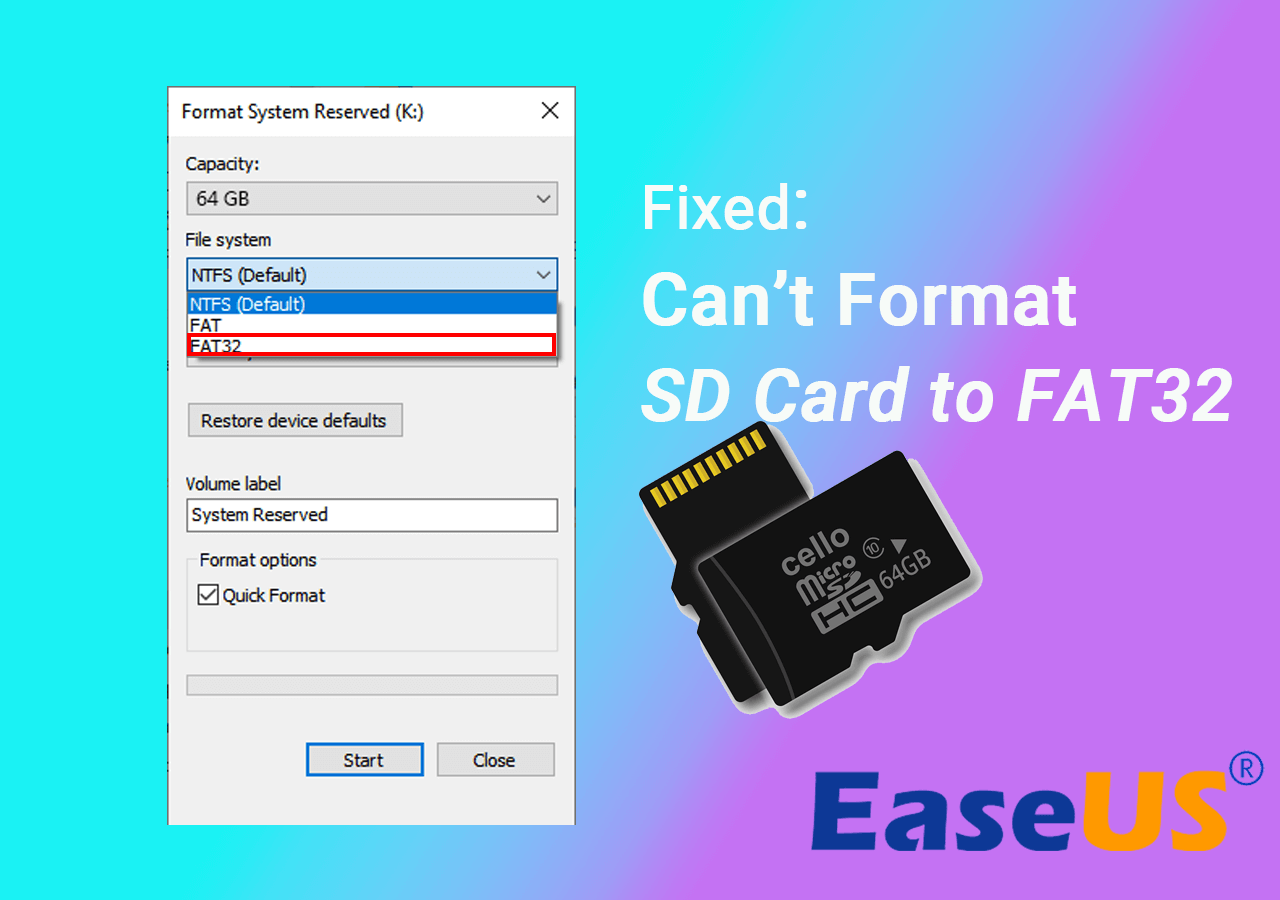
SD card is a portable storage device, which is widely used in cameras, camcorders, and mobile phones, to extend internal memory. The FAT file system seems to be compatible with all these electronic devices. However, sometimes, you may want to format the card from FAT32 to NTFS, so you can use it as a storage device on a Windows laptop or computer but not for using on an Android phone or tablet.
On this page, we would like to introduce the three most widely used SD card formatter tools to help you easily format SD card to NTFS on PC other than Android. You can choose one that works best for you.
- Option 1. Format SD Card to NTFS in Windows File Explorer (Default Program)
- Option 2. Format SD Card to NTFS in Windows Disk Management (Default Program)
- Option 3. Convert SD Card to NTFS with EaseUS Partition Master (Third-party Free and No Data Loss)
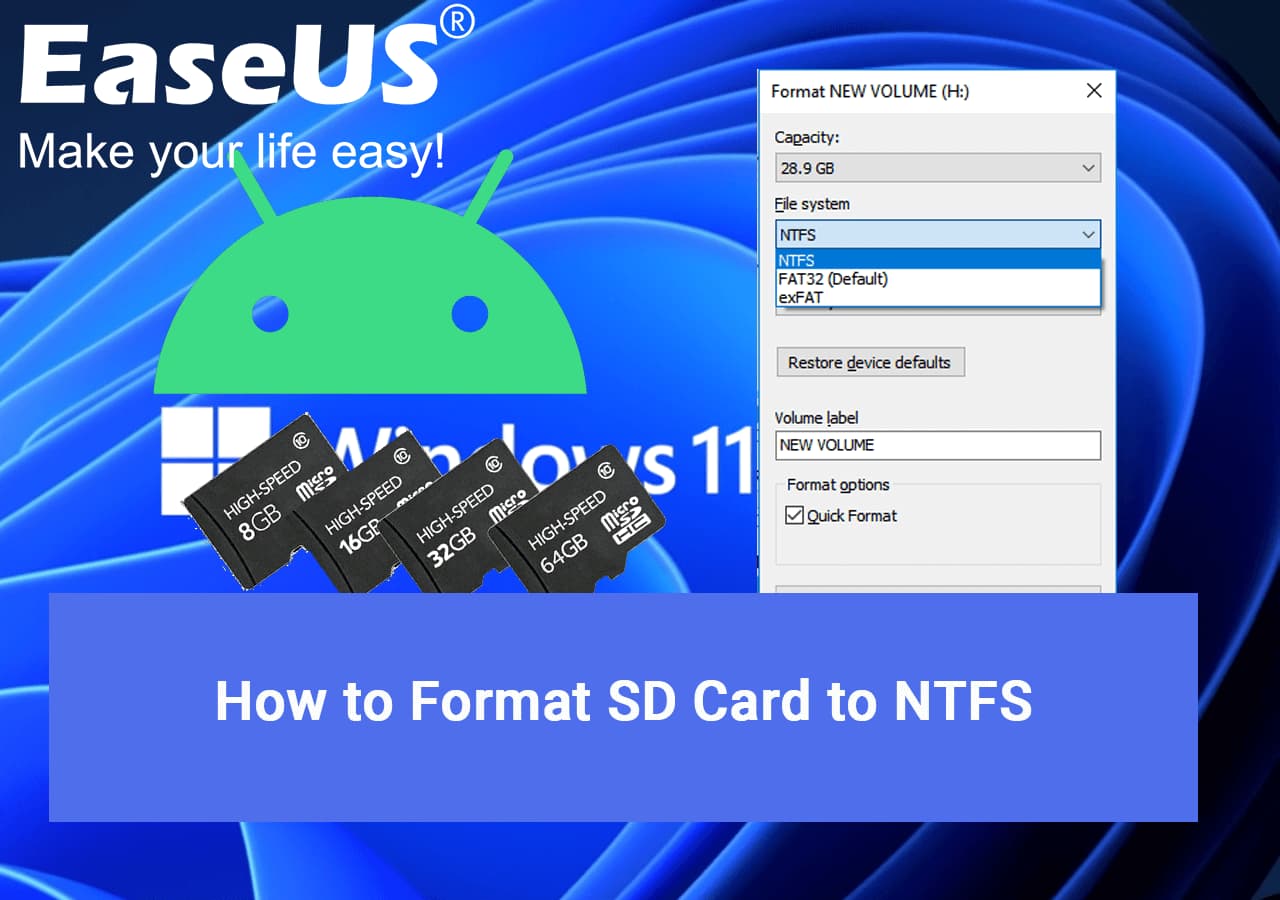
Preparation: Backup Essentials Before Formatting SD Card
As we know, disk formatting is the process of preparing a storage device such as a memory card, USB flash drive, internal/external HDD and SSD for initial use. In most cases, by formatting the SD card we can solve most RAW and corruption issues. However, at the same time, formatting will erase data completely from the SD card for a fresh start.
Thus, if you choose the default Windows Explorer and Disk Management to format SD card, you must copy the data, if you had any, to the other drive for a backup. For a step-by-step guide, you can refer to this tutorial page for help:
How to Backup SD Card before Formatting
Are you looking for an efficient way to backup SD card data? On this page, you'll learn 4 practical methods as shown below to backup everything on your SD card.
Alongside the Windows formatting solutions, the third-party EaseUS partition manager can directly convert SD card from FAT32 to NTFS, which will cause no data loss.
Don't miss: How to recover formatted SD card
How to Format SD Card to NTFS in Windows 10/8/7 (3 Ways)
The recommended three ways are generally easy-to-use without requiring much knowledge. You can opt to format a microSD card, SD card, SDHC card, SDHX card for Android phones, digital cameras, camcorders, Nintendo DS or the 3DS as you want.
Option 1. Convert (FAT32) SD Card to NTFS with EaseUS Partition Master
EaseUS Partition Master Free is a third-party free partition manager software that helps you deal with all disk-related issues. Different from formatting the SD card to NTFS, it allows you safely convert FAT16/32/exFAT/EXT to NTFS while keeping all your data intact with no hassle.
Step 1. Install and launch EaseUS Partition Master on your computer.
Step 2. Go to the Disk Converter tab, select "FAT => NTFS" and click "Next."
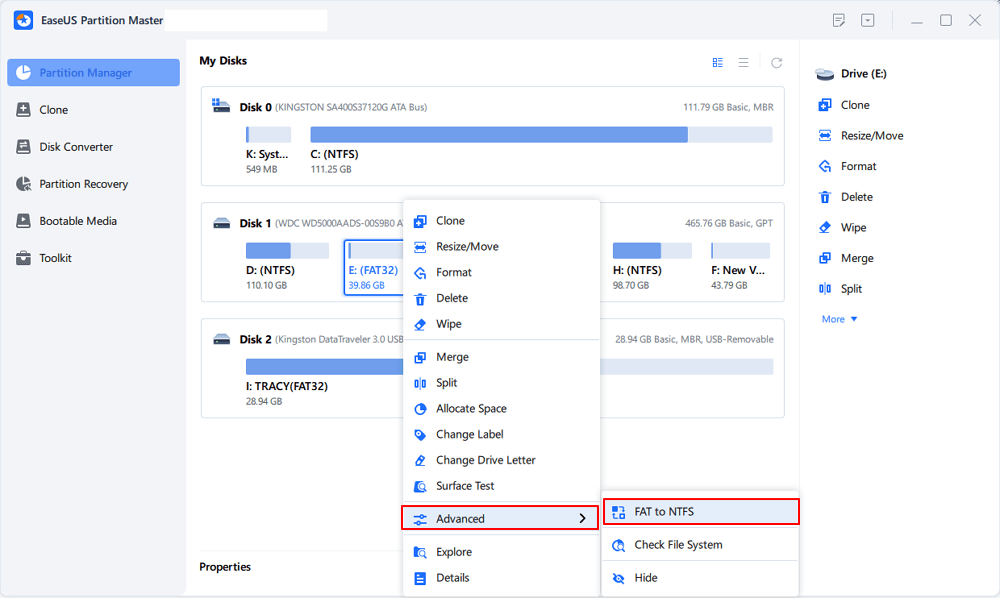
Step 3. Select the partition that you want to convert to NTFS and then click on "Convert." (Tick the "Show More" option in the panel's upper right corner to display the hidden partitions.)
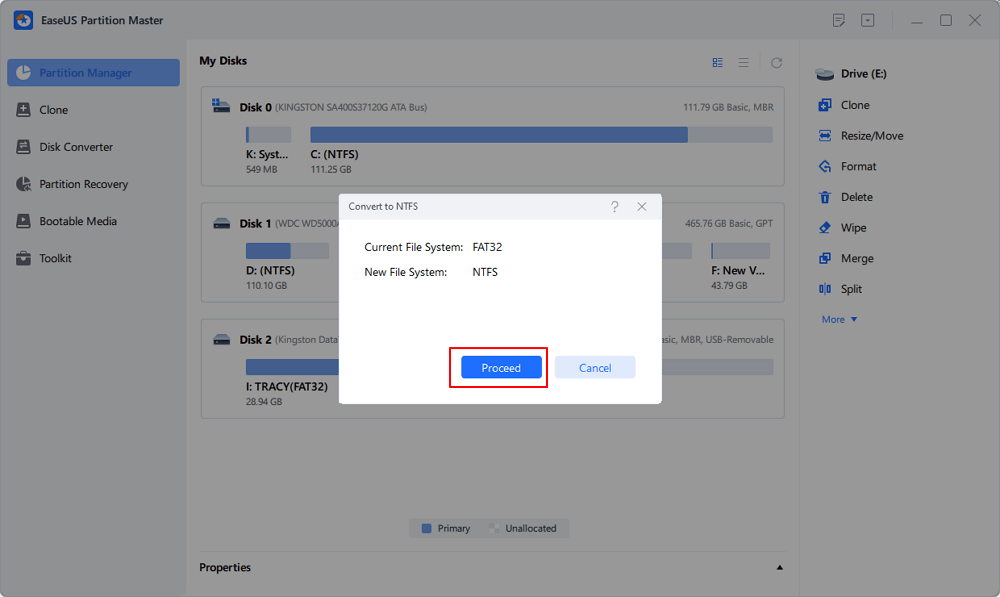
Step 4. Wait until the operation process is finished.
EaseUS Partition Master Free can help you format an SD card to NTFS or other file systems effectively and quickly. On top of that, it's a versatile disk management tool that comes with many other useful features for you to explore, such as:
- Resize/move a partition, merge partitions
- Convert between GPT and MBR
- Migrate OS
- Copy partition, etc.
All in all, it's worth downloading on your computer to regularly manage and optimize your computer hard drive performance.
Option 2. Format SD Card to NTFS in Windows File Explorer
Step 1. In Windows 10/8/7, press Windows + E keys to open the Explorer.
Step 2. Right-click on the SD card and choose "Format".
Step 3. Choose NTFS as the target file system and perform a quick format. Click "Start".
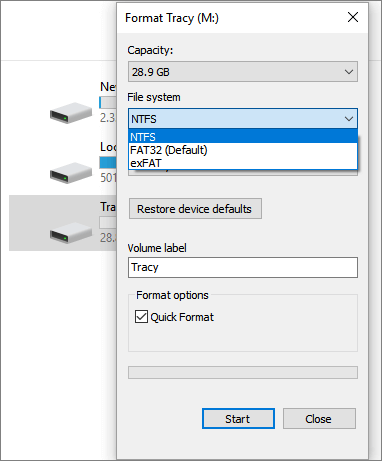
While formatting your SD card in Windows Explorer, it's likely to get the error message "Windows was unable to complete the format". This is a general issue that needs further troubleshooting in Option 1 and Option 3.
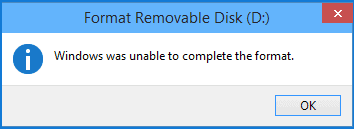
Option 3. Format SD card to NTFS in Disk Management
Step 1. In Windows 10/8/7, press Windows +R keys to open the Run box, type diskmgmt.msc, and hit Enter to open the Windows Disk Management.
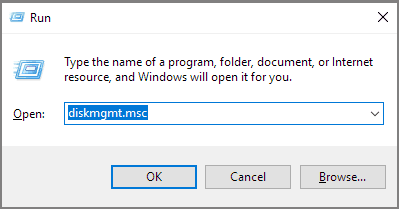
Step 2. Locate the SD card, right-click on it and choose "Format".
Step 3. In the Format dialogue, select NTFS as the target file system. Use the default value in the Allocation unit size for the SD card and perform a quick format.
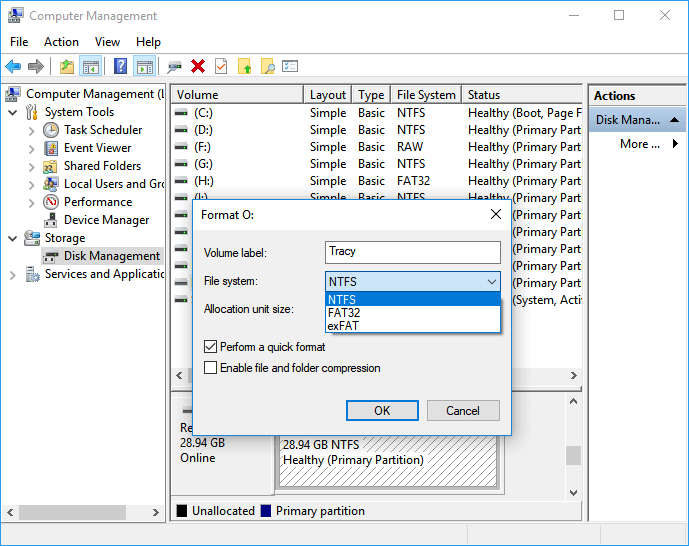
Bonus Tip:
If Windows warns that it can't format the SD card, don't worry. You can directly apply EaseUS Partition Master with its formatting feature for help. It will successfully fix SD card formatting error with success with the following tutorials:
To Sum Up
Regarding the topic "how to format SD card to NTFS", we come up with three free & effective ways for you. Each SD card formatting method does well in NTFS format without noticeable limits. One difference is that the native Windows programs will format your SD card by erasing data on it, while the third-party EaseUS Partition Master Free can directly convert the SD card from one file system to NTFS without affecting data.
As a matter of fact, chances are that Windows Explorer and Disk Management can hardly format SD card to FAT32 as it did to NTFS, particularly when the SD card capacity exceeds 32GB. This is a long-term defect, and that's why you'll have to apply EaseUS Partition Master to format a 64GB SD card to FAT32.
Related Topic: Should You Format Android SD Card to NTFS or FAT32?
Android supports the FAT32/EXT3/EXT4 file system. It doesn't support the NTFS file system. If the SD card or USB flash drive you insert is the NTFS file system, it won't be supported by your Android device. Note that most Micro SD cards that are 32 GB or less come formatted as FAT32. Cards above 64 GB are formatted to exFAT file system. If you are formatting your SD for your Android phone, you will have to format it to FAT32.
Read further: FAT32 vs NTFS: What's the Difference?
FAQs about Formatting SD Card to NTFS on Android
If you are still having questions on formatting SD cards to NTFS, follow and find answers here.
1. Format SD Card to NTFS, what allocation unit size to choose?
The default setting is usually the best choice for most users. You can dig deeper by reading the explanation from experts:
If you are a "Standard User" by Microsoft's definition, you should keep the default bytes. Basically, the allocation unit size is the block size on your hard drive when it formats NTFS. If you have lots of small files, then it's a good idea to keep the allocation size small so your hard drive space won't be wasted. If you have lots of large files, keeping it higher will increase the system performance by having fewer blocks to seek.
Nowadays, hard drive capacity is getting higher and higher, which makes a small difference by choosing the right allocation size. Suggest you just keep the default. Also, keep in mind that the majority file is relatively small, larger files are large in size but small in units.
2. Can I format my SD card to NTFS?
Yes, sure. To format your SD card to NTFS, you can directly turn to File Explorer, Disk Management, EaseUS Partition Master for help. For advanced users, you can even format SD card using CMD. Aside from these methods, you can also apply the camera, mobile phone, etc., to format your SD card as long as the file system of your SD card is supported by the device.
3. What format should SD card be for Android?
Note that Android supports FAT32, exFAT, and EXT3/4. FAT32 and exFAT are two file systems that are most widely used on Android phones for internal or adaptable storage. If your SD card is 64GB or larger, set exFAT to the card, and FAT32 to a 32GB or smaller SD card.
How Can We Help You
About the Author
Updated by Tracy King
Tracy became a member of the EaseUS content team in 2013. Being a technical writer for over 10 years, she is enthusiastic about sharing tips to assist readers in resolving complex issues in disk management, file transfer, PC & Mac performance optimization, etc., like an expert.
Product Reviews
-
I love that the changes you make with EaseUS Partition Master Free aren't immediately applied to the disks. It makes it way easier to play out what will happen after you've made all the changes. I also think the overall look and feel of EaseUS Partition Master Free makes whatever you're doing with your computer's partitions easy.
Read More -
Partition Master Free can Resize, Move, Merge, Migrate, and Copy disks or partitions; convert to local, change label, defragment, check and explore partition; and much more. A premium upgrade adds free tech support and the ability to resize dynamic volumes.
Read More -
It won't hot image your drives or align them, but since it's coupled with a partition manager, it allows you do perform many tasks at once, instead of just cloning drives. You can move partitions around, resize them, defragment, and more, along with the other tools you'd expect from a cloning tool.
Read More
Related Articles
-
Resolve 100% Disk Usage in Windows 11
![author icon]() Tracy King/2026/01/29
Tracy King/2026/01/29 -
How to Fix Corrupted Hard Drive Using CMD
![author icon]() Cici/2026/01/29
Cici/2026/01/29 -
4 Ways to Bypass Windows Login Screen Without Password
![author icon]() Oliver/2026/01/29
Oliver/2026/01/29 -
How to Clone A Hard Drive on Windows 11? 2026 Guide
![author icon]() Tracy King/2026/01/29
Tracy King/2026/01/29
Hot Topics
EaseUS Partition Master

Version 20.0 is here - full exFAT support, easier disk partitioning, and PC performance optimization.








